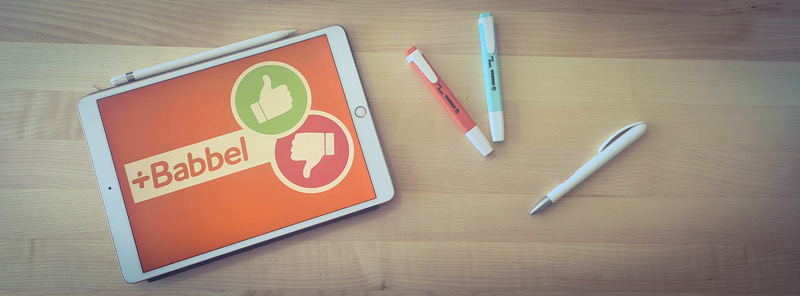When you think of well-known language courses, Babbel usually comes to mind. For years, the company has impressed learners with its proven, traditional approach and well-structured classes. Unfortunately, the overall experience has been increasingly disappointing, as we found during our thorough evaluation. We’ll present three Babbel alternatives (apps similar to Babbel) that do many things better!
Table of Contents
Babbel Alternatives: Who Does It Better?
Babbel has built its reputation over the years by offering a traditional language-learning method reminiscent of school lessons. With a mix of grammar explanations and varied practice exercises, it’s hard to go completely wrong—or is it? Recently, and especially after our multi-week evaluation, it’s become clear that alternative methods can deliver stronger results for certain learning styles.

‒ The Best Language Course of 2025 ‒
We’ve tested dozens of language courses…
But only ONE takes the #1 spot!
That said, Babbel has made impressive strides after a few disappointing years that saw several features removed. The platform now feels more like a complete learning ecosystem than just a language course on your phone. Alongside online lessons through Babbel Live, users can enjoy podcasts, learning games, and AI-driven exercises.
Mondly – Achieve Success without Rote Learning
Mondly focuses on learning a new language without rigid memorization. The provider leans heavily on images and audio flashcards, encouraging users to infer new vocabulary from familiar contexts. The learning path is quite flexible—you can jump between topics as you please, which is a fantastic approach!
Mondly’s pricing also makes it one of the top Babbel alternatives: for a single payment of around €100, you get lifetime access to 41 languages—no subscription or hidden fees. Plus, it includes the free companion app Mondly Kids!
Rosetta Stone – An Intuitive Path to a New Language
Rosetta Stone’s patented “Dynamic Immersion” method helps you learn a new language without relying on your native tongue. It essentially places you directly in the target language. The results speak for themselves—this approach is more brain-friendly than many traditional methods.
The offering is rounded out by a complete learning suite, featuring lessons, short stories, pronunciation training, and even a virtual classroom experience. There are 24 languages in total, starting at €9.99 per month or a one-time lifetime offer of around €200. Check out this article for a detailed breakdown of costs.

‒ Language Course Discounts ‒
Find the best discounts and exclusive coupons for top
language courses here!
+ + + Limited-Time Deals +++ Some Offers Expiring Soon +++ Don’t Miss Out! + + +
Busuu – A Classic Approach with a Unique Community
Busuu, much like Babbel, delivers a traditional mix of grammar explanations and practice exercises. Its key advantage is an active community of native speakers and fellow learners, who provide feedback on open-ended questions—removing the limitations of an algorithm-based assessment.
Busuu can be used in its basic form for free, with premium options starting at €6.49 per month, which makes it one of the more budget-friendly Babbel alternatives. For comparison, check out the latest price overview of popular language courses.
Conclusion: Trusted for Years, but Not Unchallenged
That’s the best way to describe Babbel. Even so, the provider definitely deserves its current place among the Top 10 Language Courses. If you prefer a more “classical” approach with plenty of explanations and bite-sized practice tasks, Babbel is an excellent fit—especially if you’re learning a language commonly studied in Germany. Some languages even reach C1 level (according to the CEFR) on Babbel.
Platforms like Mondly, Rosetta Stone, and Busuu bring unique and innovative learning features to the table, each with its own intriguing approach. We can recommend all four providers, and each offers a free trial. It’s well worth experimenting to see which style suits you best!
